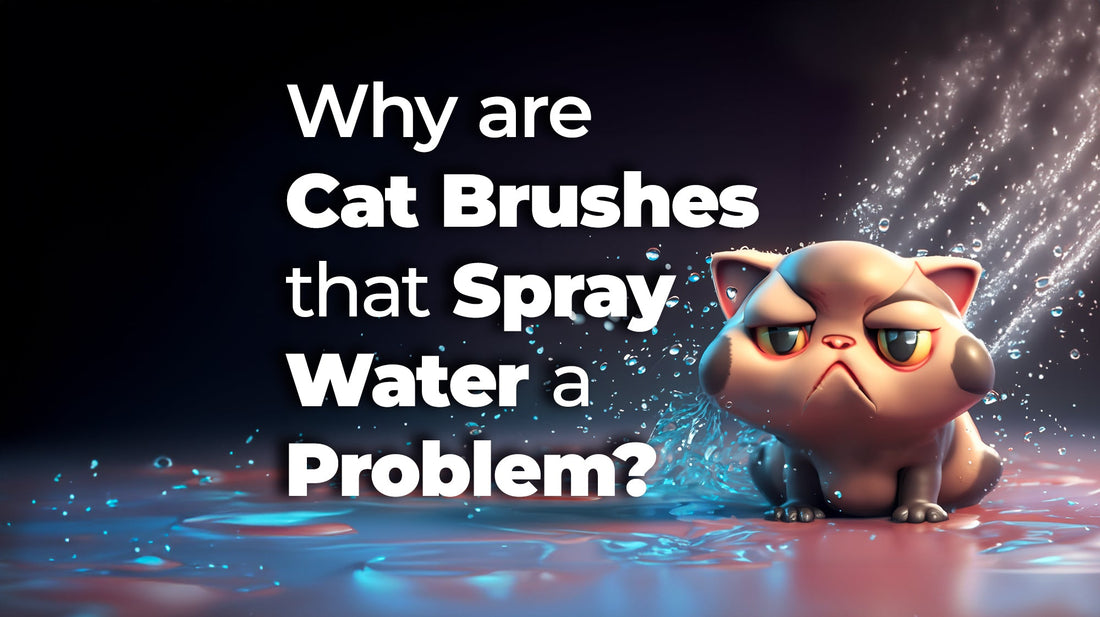

Did you know that using any cat brush or pet brush with water or a generic cat brush like a “misty brush” or “steamy brush” can potentially pose health risks for your cat? Despite the perceived effectiveness at getting the fur out and recent waves of viral popularity, no professional groomers or veterinarians have recommended them. In this article you’ll find out all the reasons why.
A steam cat brush, misty, or water spraying pet brush is a type of brush that has an added reservoir designed to hold water and release the water while brushing. This can either be released by a sprayer or a misting feature. Generally these can be manual powered or battery operated and in most cases the product comes with sanitizing drops or a “pet shampoo”.
High Maintenance
Most people aren’t aware, but that little container of drops that might be included is there to prevent mold. A fundamental flaw in having a brush contain water is that it will grow mold.
Pet brushes are designed to remove hair, and in the process of brushing your pet, you’re removing dust, dander and dirt. Unfortunately, these are all perfect ingredients that accelerate the creation of mold in the perfect climate, which unfortunately is inside a wet brush. To prevent mold you’ll need to clean and dry your brush after every use. Even with regular cleaning and inspecting, brushes with water in them are a high risk container for growing mold.
Mold can be deadly before it’s even visible
Mold comes in many forms, and some pets can be allergic to its effects before it’s even visible to your eyes. If you are using a misting brush that contains mold there’s a risk that you’ll be spraying spores directly onto your cat fur and they could ingest them or breathe them in when they self-groom their coat.
If your cat has been feeling under the weather it’s important to know the signs of mold poisoning. If they show any of these symptoms, be sure to get them checked out at your veterinarian.
Mold can be a life threatening problem if it’s not caught quickly, so it’s best to know the signs and take steps into reduce the risks when possible.
Discomfort and Stress
The facts are that a majority of cats are not fond of water, and being brushed with a wet brush can cause discomfort and stress. Cats are known for their dislike of water because they actually find it uncomfortable. The Dodo says:
“A cat’s tactile and olfactory sensations are relatively more sensitive than a human’s,” Dr. Spano explained. “[So] equating the discomfort a human feels upon being spritzed with water to the discomfort a cat feels upon being spritzed with water is unfair and not rational.”
This means that spraying your cat with water is simply not very nice. They don’t like it and the damage in causing them stress every time you brush will affect how they perceive you and can potentially damage the bond you have with your pet.
Getting a cat’s coat wet is a form of punishment
To discipline a cat, it’s not even recommended to spray them with water for the damaging effects this can cause them. A great article on the effects of spraying your cat can be found here on the cats.com website.
Hating water is in a cat’s genes
Cats are fastidious animals that spend a great deal of their day grooming themselves. They don’t want you doing what they enjoy to do themselves. Wet fur is extremely uncomfortable for a cat and depending on the breed it can actually take a very long time to dry. Wet fur is also heavier than dry fur (which is why it appears to collect more when it’s wet) and thus makes a cat less nimble and easier for predators to catch. They may not have any predators in their home, but that won’t stop them from disliking it.
Skin Irritation
Wet brushing can potentially irritate a cat's sensitive skin. Most owners don’t realize just how sensitive a cat’s skin really is. It’s also why metal brushes and fur rakes are not recommended for daily use by any veterinarians or groomers. Moisture can exacerbate existing skin conditions or cause new ones to develop, such as fungal or bacterial infections. Additionally, wet hair makes your cat’s fur more prone to tangling and matting, which can further irritate the skin and create bigger issues later.
Temperature Regulation
Cats rely on their fur for insulation and temperature regulation. A cat misting brush or any brush that is wetting their fur can disrupt this natural insulation, leading to discomfort, especially if the environment is cool. Have you noticed that your cat always finds the sunny spot in your house or gravitates to the top of every warm spot in your home? Cats will struggle to regulate their body temperature effectively if their fur is wet. In a cold home or in the winter this could potentially lead to hypothermia.
Negative Associations
Forcing a cat to endure an unpleasant experience like being brushed with water can create negative associations with grooming in general. This can make future grooming sessions more challenging and stressful for both the cat and the owner.
Cats really don’t need to shower every day
Cats are very clean animals. Unless your cat has rolled around in dirt or you’ve spilled something on them you won’t need to shower your cat with a misting brush or steam brush.
Water isn’t needed
Customers have said that there’s an equal amount of hair removed when brushing without the use of water. Wet hair is sticky and gives the appearance of more being removed. Luckily, with a good dry brush it is a safer, more gentle and more pleasurable experience. You’ll still be removing hair, just without the risk of harming your cat.
Overall, it's best to avoid using water when brushing a cat unless absolutely necessary, such as in cases of heavy soiling or specific medical conditions that require it. Instead, opt for dry grooming techniques and let’s keep all our pets living happy, healthy and for as long as possible.
Share this post with other cat lovers you know by clicking one of the links below.
No comments
0 comments